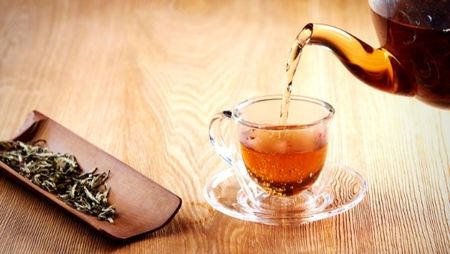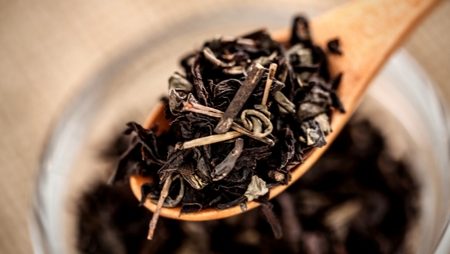
Black tea is one of the most popular beverages and provides significant worldwide polyphenol consumption, the same as coffee. Despite this, Black Tea also contains some unique amino acids called: “L-Theanine” and other substances that can elevate “gut” health.
Most Western people are not aware of the “back tea” benefits, same as green tea; however, Black tea is different in taste and other aspects from green tea because it is the fermentation process(delicious).
During this process, the catechins in the tea leaves (Camellia sinensis) go through a lot of oxidation and oligomerization, which changes their structure. This is unique because the taste comes from that fermentation. It’s like “the brewing” process.
Overview
- Black tea, which has undergone complete fermentation, makes up around 75% of the world’s total tea consumption.
- Black tea polyphenol (BTP) composition is dominated by theaflavins and thearubigens (60–70%), but its primary bioactive substances are poorly absorbed, but it leads to support gut bacteria on the other hand called second gut.
- According to the study, black tea enhanced the diversity of the gut flora. Moreover, black tea boosts the production of short-chain fatty acid (SCFA) syntheses.
- We all know that gut flora abnormalities are associated with poor nutrition or excessive drug usage. Some researchers discovered that this phenomenon might be remedied by utilizing Black Tea Polyphenol.
Black Tea polyphenol reduced antibiotic-induced decreases in gut flora quantity and diversity and enhanced probiotic bacteria such as Eubacterium, Roseburia, and Lactobacillus.
I heard a lot of people asking, “Why Does Black Tea Taste Better Than Green Tea?” I believe it’s because aromatic taste and color occurred during the fermentation process.
Now, Let’s talk about the benefits of Black Tea.
Protective For Iron Overload, And Black Tea
If you don’t know about the harmful impact of iron overload on the body, you are not alone.
Most biohackers, nootropics experts, and people who want to optimize their biology as well as longevity dismissed the part of potential Mitochondrial Damages and Oxygen utilization issues coming from “iron toxicity,” which damages healthy cells and
Iron overload happens when your body stores an excessive amount of iron. Unfortunately, excessive iron impairment of mitochondrial DNA (mtDNA) has been linked to high levels of cellular iron, causing inflammation, detrimental to mitochondria, cells, oxygen intake, and so on.
Well, it is not just for mitochondria but also for brain health.
According to research, Iron overload has been clearly shown to disrupt neurotransmitter homeostasis. When iron is infused into the substantia nigra, it disrupts monoaminergic systems, notably the dopaminergic pathway, which results in Parkinson-like symptoms of motor impairment. (source)
Related: This is the most Proven Way to Increase Your Dopamine Levels
Black Tea Can Lower Iron Overload
Black tea also might help prevent “iron” overload by reducing iron absorption by up to 95 percent. Tea also has a significant inhibitory impact on non-heme iron absorption, which contributes to 70-90% of dietary iron.
Tannins polyphenols In Black Tea
Tannins are responsible for black tea’s delicious flavor. It is accepted that tannins in Black Tea can reduce iron availability before absorption through the formation of insoluble antinutritional-mineral complexes, and ) tannins at commonly consumed amounts are linked to changes in iron status among people.
The same applies to coffee. According to research, iron absorption following a meal decreased by an average of 39% after consuming coffee.
I like coffee, and I believe it’s good for focusing and suppressing appetite especially fasted state. However, excessive coffee makes me anxious as well as affects my sleep.
For that, I switched my Coffee to make Decaffeinated Coffee. It still has the same benefits as regular coffee, thanks to Polyphenols.
Note: If you are highly sensitive, you can use decaffeinated Black Tea
Black Tea significantly reduces iron absorption when provided with a test meal. In the Black Tea group, the absorbation iron was reduced by about one-third compared with that of the control group.
Another strategy is to Get Rid of Excess iron.
- Exercise: can helps you use excess iron for energy and mitochondrial energy, and the body and muscles utilize more iron while exercising and sweating.
- Milk Thistle: According to studies, milk thistle may reduce ferritin levels, improve liver health, and address other issues related to iron overload. Milk thistle polyphenols, such as silymarin and silybin, have been demonstrated to aid liver function and promote health.
- Donate blood: The best strategy for optimizing your iron level and helping others is donating blood. On average, you can give 20% of your iron in just one session of blood donation, which will help to overcome iron overload.
Black Tea Can Support Gut Bacteria
Gut bacteria play critical roles regulation of inflammation, as well as well being that’s why they are called the “second brain.” Black Tea can helps support gut bacteria, and it’s simple to consume.
The majority of your microbiome lives along your gut, which works as a barrier to prevent dangerous microorganisms from entering your bloodstream. Your gut lining allows nutrients in a while, preventing disease-causing microbes when everything is working correctly.
- There are things you can feed your gut bacteria a whole lot more prebiotic fiber. Eat a variety of polyphenol-rich vegetables, and drink coffee and tea.
- But the unique component is that Black tea polyphenols help gut bacteria and their antimicrobial activity. 2%–20% of TPs are absorbed through the intestinal wall, depending on the structures of the TPs. This can have a positive effect on native microbial diversity and functioning. As a result, the majority of Black tea will pass into the large intestine undigested, where it might alter microbial communities.
Plus, The interactions between Black tea polyphenols and gut microbiota will lead to alterations in gut microbiota composition and the production of metabolites, such as short-chain fatty acids and bile acids. These facts make Black Tea better than Green tea, I mean better taste, and support bacteria which is far more important than other things.
Combining Black tea with a healthy lifestyle, such as boosting mitochondria by good quality sleep and intermittent fasting, meditation, wim hof breathing, and avoiding glyphosate eating fermented food such as kefir, will be good strategies for longevity and aging.
Related: Longevity Lifestyle, Tips, Tricks, And Supplements
Which Kind Of Bacteria Increased By Black TEA?

Black tea isn’t probiotic, but it’s a good source of prebiotics. Prebiotics feeds probiotics and gives support to them.
For example, Black tea polyphenols could significantly increase some of the things included:
- Bifidobacterium spp. (Low Bifidobacteria numbers have been associated with a wide range of diseases.)
- Lactobacillus spp.
- Enterococcus spp. (Enterococci probiotics can cure and/or prevent such as IBS, antibiotic-induced diarrhea, and functional and chronic intestinal diseases.)
Black tea also inhibited pathogenic bacteria such as Bilophila, Enterobacteriaceae, and Fusobacterium varium.
Black Tea has a unique antioxidant called “epigallocatechin-3-gallate (EGCG) “, and EGCG encourages the growth of beneficial bacteria while also lessening the number of metabolites.
Epigallocatechin-3-gallate (EGCG) can alter gut bacteria
Plus, Multiple research has shown that EGCG can help prevent or reduce obesity-related diseases by influencing the microbial diversity of the gut.
However, studies have demonstrated the low absorption of epigallocatechin gallate (EGCG), but you can enhance the bioavailability by using fish oil (omega-3 fatty acids, vitamin C, and selenium the EGCG bioavailability as well as enhancing its antioxidant activity.
Green Tea vs. Black Tea: Which One Is More beneficial?
Two of them are beneficial. But, i believe High-Quality Black Tea is more for easy to drink and better for “gut” bacteria. For example, if you know that the gut-brain connection is crucial for anxiety, you might act to optimize the “gut”, so Black Tea might be a better choose.
For antioxidant purposes and nutritional values, Green Tea is far better than Black Tea. Let’s check the facts:
- If you have inflammatory digestive issues, Black Tea is a better option as well as easy to consume and supports good bacteria. The gut-brain axis (GBA) links emotional and cognitive brain areas with digestive activities, which is supported by Black Tea.
- Green tea has a more active ingredient called epigallocatechin-3-gallate (EGCG) than Black tea. This makes it perfect for antioxidant protection and mitochondrial health.
- Also, green tea slightly has more L-theanine, an amino acid that’s calming than black tea.
- However, if you have already consumed antioxidant-rich foods, supplements such as Astaxanthin, Resveratrol, or others, black tea might be a better option.
The Role Of The Black Tea In The Gut: Butyrate
Here, actually, one of the most important acids is called butyrate acids for our gut health.
Healthy gut microbes contribute to the integrity of your gut lining. Whenever bacteria consume prebiotic fiber or resistant starch, they create butyric acid, which fuels the cells that line the intestinal wall.
Butyrate is essential for controlling host gene expression in colon epithelial cells and also prevents colorectal cancer.
Regardless, black tea’s special component can help feed “gut bacteria.” by stimulation short-chain fatty acids.
More Deep-Dive Into Black Tea And Short-chain fatty acids (SCFAs)
Let’s explore our artistic science-based knowledge more about Short-chain fatty acids and their benefits to our gut.
Anaerobic gut bacteria ferment indigestible fibers and proteins, and peptides to create SCFAs (acetate, butyrate, and propionate), which regulate the intestinal barrier, energy homeostasis, insulin sensitivity, glucose, and lipid metabolism.
According to a study, Polyphenols from green tea, oolong tea, and black tea were found to boost SCFA levels. But another research found that interventions with black tea elevated the production of acetic, propionic, and butyric acids in the gut.
So, you might ask, “What are the benefits of activating short-chain fatty acids?”
Activation of Short-Chain Fatty Acids And Benefits
- SCFAs could also enhance energy metabolism and the intestinal barrier through AMP-activated protein kinase (AMPK) activation. AMPK affects appetite, satiety, and how cells utilize and store energy.
- SCFAs can protect against pathogenic bacteria and protect the intestinal mucosal barrier by expressing MUC2, which thickens your mucous lining.
- Also, propionic acid may play a crucial role in appetite regulation and energy homeostasis.
“Black tea polyphenols (BTPs), however, mainly consist of high-molecular-weight species that predominantly persist in the colon. There, they can undergo a wide range of bioconversions by the resident colonic microbiota but can in turn also modulate gut microbial diversity.”
Avoid Sugar In Tea
If you make one change to improve your gut health, avoid sugar. Why? Excess sugar is the prime culprit behind small intestinal bacterial overgrowth (SIBO) and Candida. I don’t like sugar not because it can cause insulin spikes or suppress BDNF production(new brain cells), it stimulates “dopamine” release and has addictive properties. As i guy, I wanted to avoid all of the “addiction” things as much as possible or at least minimize them.
Also, do not eat industrially grown animals again because of the antibiotics they are given, and the glyphosate in their diet will end up in your stomach and kill your gut bacteria.
The best way to use Black Tea without sugar is just plain. If you are in metabolic health, you can use a little bit of “honey,” which makes it tastier.
Don’t Over Do Black Tea, Green Tea, And Coffee
Consuming too much Black Tea or another type of caffeine beverage isn’t the best strategy. A daily dosage of 1-2 cups of coffee or tea(3-4 cups) is great and will prevent your caffeine addiction and sleep disturbance.
Don’t forget that when you consume caffeine, Sodium, Magnesium, and Chloride are the main minerals that leave the body. So, you should replace them.
Another reason for limiting your Caffeine intake is that caffeine drains GABA levels. For that, coffee drinkers are more likely to experience anxiety, irritability, panic attacks, and other symptoms of nervous tension.
More information: Relaxing and Focusing: GABA and Glutamate in the Human Brain